Mar 21, 2025 – 33rd Day of the 100-Day Dharma Talk, Friday Dharma Q&A
Hello everyone. Today marks the 33rd day since we began the 100-Day Dharma Talk. It feels like we just started yesterday, but already a month has passed, and we’ve completed more than one-third of the journey. The spring equinox has passed, and the weather is gradually becoming warmer. In Seoul, the forsythias have begun to bloom with their bright yellow flowers.

After completing his morning practice and meditation, Sunim headed to the Jungto Social and Cultural Center to give his Friday Dharma Q&A talk. Volunteers had arrived early to welcome citizens who came to attend the Dharma Q&A.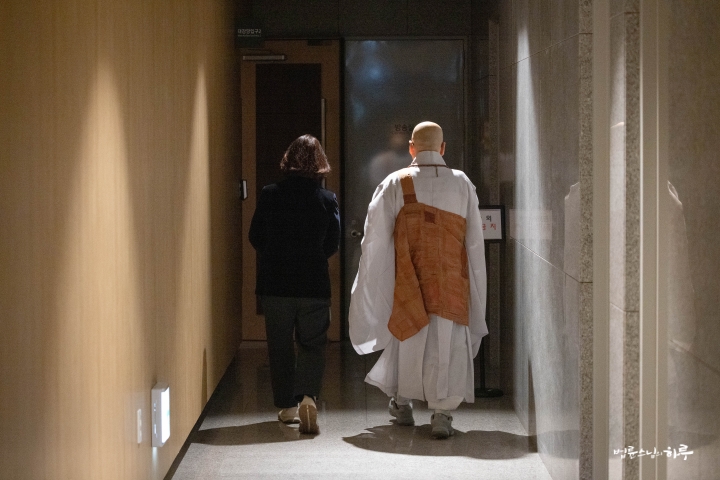
At 10:15 AM, with about 100 people in attendance, the Friday Dharma Q&A began with the recitation of the Three Refuges and Words for Practice. Approximately 3,200 people were connected to the YouTube live stream.
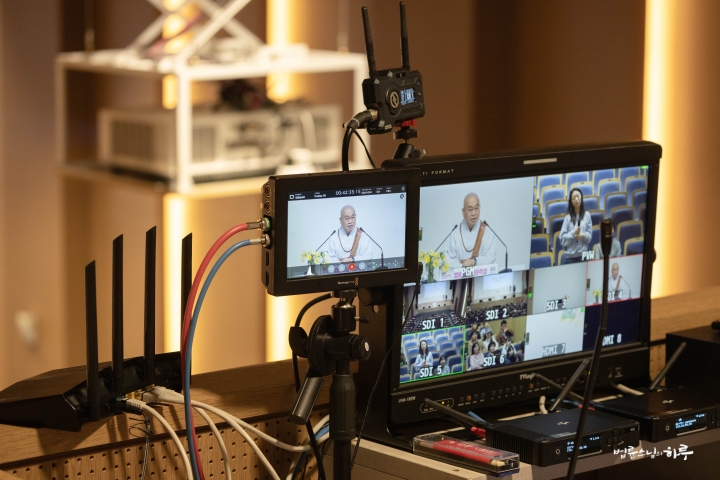
First, Sunim introduced the purpose of the Dharma Q&A to the audience and viewers.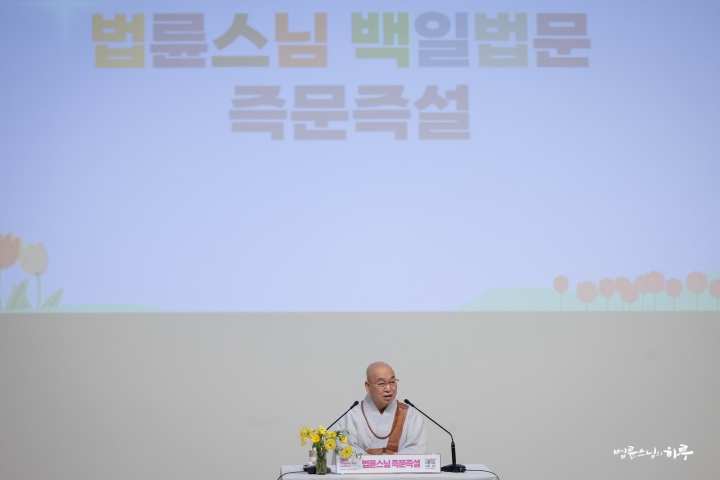
“Everyone experiences suffering in their minds as they go through life. We may also have questions about many things in the world. When we have suffering in our minds, we can be freed from that suffering by honestly expressing and sharing it. If we have questions, we need to explore them to find answers. Dharma Q&A is about expressing and discussing our suffering or questions. You don’t need to prepare questions in advance, and if you don’t have any questions or suffering, you don’t need to ask anything. However, if you do have suffering or questions, feel free to speak comfortably. You don’t need to speak eloquently; just express what comes to mind. There are no restrictions on the topics of questions or the content of conversations. Please feel comfortable sharing.”
Then, people raised their hands to ask Sunim questions. During the 90-minute session, six people had conversations with Sunim. One of them sought Sunim’s advice because he was considering quitting their job due to dissatisfaction with his work.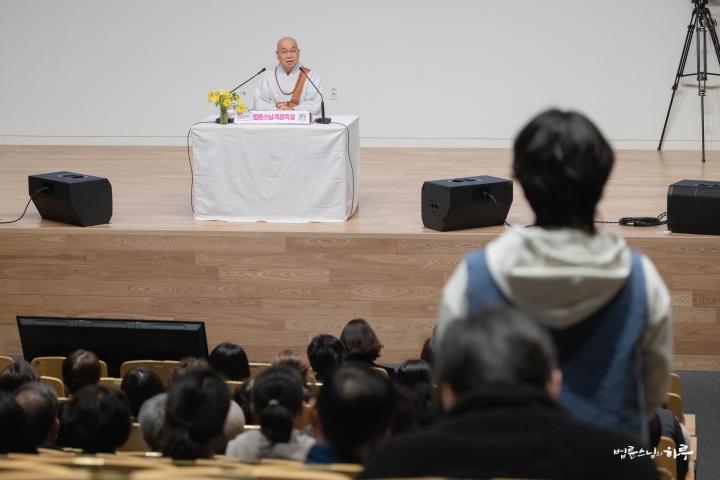
I’m Thinking of Quitting My Job because I’m Not Satisfied With My Work
“Just keep working there. At your level, it’s best to just keep working.” (laughs)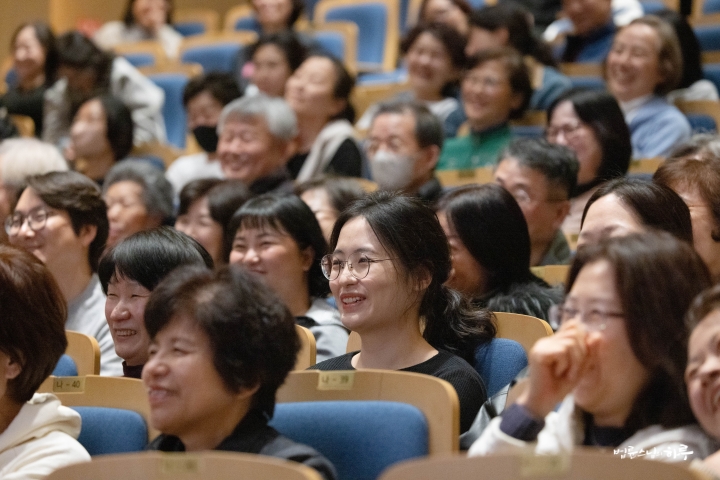
After answering with a smile, Sunim explained his reasoning in detail.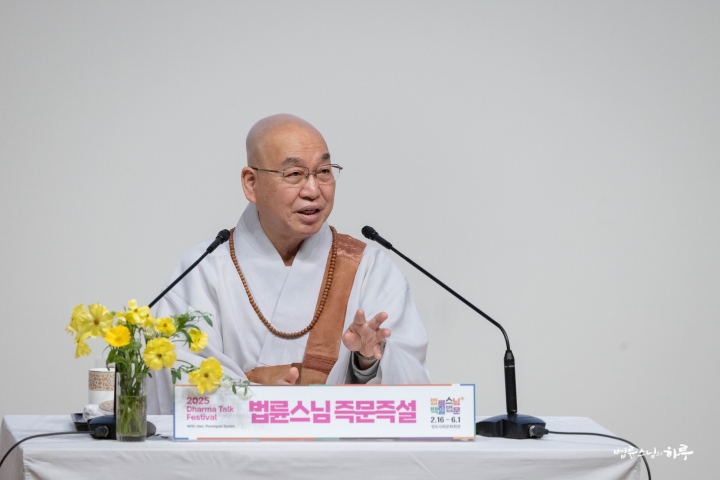
“There are two conditions under which you might consider changing jobs. First, if the new workplace offers better salary and treatment than your current one, and there’s a clear possibility of making the transition, then it’s fine to move. Second, if the new job is something you really want to do, even if it means accepting a lower salary and various difficulties, then it’s worth making the change. However, you’re not clear about what you want to do, you haven’t received an offer from another company, and you’re just vaguely wanting to leave your current job. In your current situation, the conditions for changing jobs aren’t met.
Have you ever done 108 bows? When doing bows, you do them regardless of whether you feel like doing them or not. But after finishing, it doesn’t matter at all whether you wanted to do them or not during the practice. Similarly, with a job, sometimes you want to go to work, sometimes you don’t, and before you know it, retirement age arrives. Even if someone clearly asks you to change jobs, or if you have something you definitely want to do, changing jobs still involves risk. When you change jobs, it takes time to settle in again. But from what you’ve said, nothing is clear. That’s why I’m suggesting you just continue working.
I’m not saying you should stay at your current job until you die. If clear conditions for changing jobs arise, then carefully evaluate them and make your move. If you quit your job vaguely because you don’t like working there, you’ll likely become unemployed. After a few years of unemployment, you’ll use up all your savings. With no new job and unable to return to your previous workplace, you’ll end up regretting, ‘I should have just stayed.’ This means you’ll be stuck with no way forward or back.”
“Even if I don’t find something clear, I was thinking of leaving the company despite the financial loss. Is there a way to find something clear?”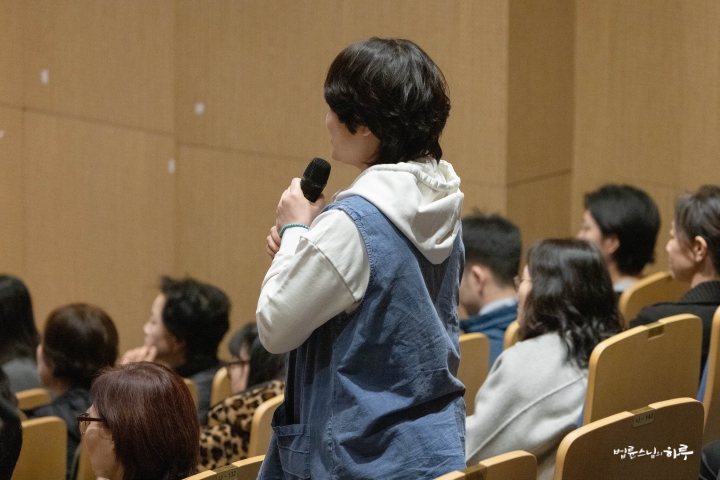
“Clear paths aren’t something you find; they appear as you live your life. If nothing appears, just continue living as you are. For example, you don’t need to agonize over whether to become a monk or not. As you live, there might come a moment when you feel you need to let go of everything and become a monk. Or as you live, you might meet someone, start living together, have a child, and build a life together. When your own choices aren’t clear, life often makes the choice for you. This too is a choice. Even when you’re wondering whether to get married, the decision often naturally resolves itself during a period of contemplation. Either the woman finds another man and leaves, or you find another woman, or a child comes along and you end up getting married. You don’t always have to make the decision yourself. When you’re not clear about your own decision, things naturally sort themselves out as you continue living.
Even if you don’t quit voluntarily, if your company goes bankrupt, you’ll automatically be out of a job. Things will resolve themselves without you having to submit a resignation letter. When choosing a career, only one or two out of ten people select a job that’s perfectly suited to them. Unless you’re in a specialized profession, most people work in fields unrelated to their college majors.
Even in marriage, it might seem like two people live together because they love each other, but that’s not always the case. Many people live together reluctantly. There’s no clear alternative person, it’s not unbearable to live together, there’s some dissatisfaction but no other options, so they just continue living together. They might promise themselves that after raising their children, they’ll live life on their own terms, but when they look in the mirror, their hair has turned gray. With no clear alternatives, they just continue living. That’s just how life is. (laughs)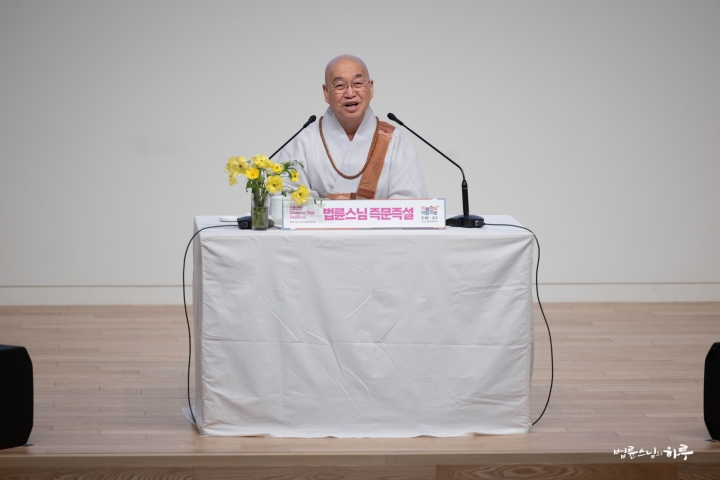
You may think you should marry someone who makes your heart flutter, but such excitement only lasts a day or two—no one stays excited for long. Of course, something eye-catching might happen even when you’re 80 years old. When that happens, you can make your choice then. But if you deliberately search for something eye-catching, you’ll never find it even if you look your whole life. If something clearly striking comes along, make your decision then; if not, just live your life as it is. Life may seem significant, but it’s not that special. Whether you live with this person or that person, whether you become a monk or not, when it’s time to die, it’s all quite similar. Everything is like a midsummer night’s dream. Whether you were famous or not, whether you made money or not, there’s not much difference. Everyone dies the same way. Your life feels exhausting because you think it must be special. If you just think of life as a small blade of grass growing by the roadside, living becomes easier.”
“Yes, thank you. I’ll do my best at my current job.”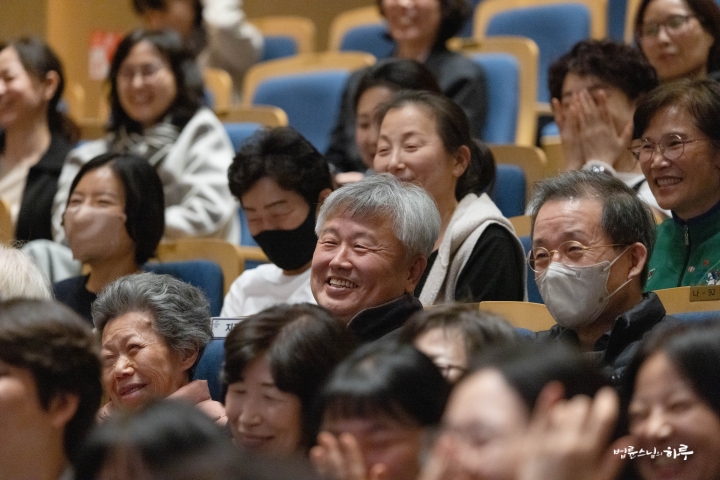
“Don’t do your best! (laughs) Instead of doing your best, just think, ‘When I go to work, I’ll just work enough to earn my meals.’ If you work less than what you’re paid for, you’ll be in debt. You need to work at least enough to earn your keep. If you do less, you might get fired. On the other hand, doing more than what you’re paid for isn’t good either. Why? Because you’ll start thinking, ‘I worked this hard, but is this all the recognition I get?’ and become dissatisfied with your company. So the best approach is to work exactly enough to earn your keep. What’s this about doing your best? Just do enough not to get fired.
Even without deciding to do your best, there will come a time when you find something you want to do. You might have no interest in people, but as you live, you might find yourself chasing after someone or discovering things you want to do. Practice means being careful at such times. Practice is about calming your passionate heart. If you’re not passionate about something, there’s no problem at all. A lukewarm life is actually very good. If anything, passion can be problematic. When your heart is on fire, you’re more likely to make mistakes. I’m not saying passion is wrong, but I’m suggesting you examine whether you might be like a mouse eating poison because something has clouded your judgment. A mouse has no problem surviving by scavenging through garbage for food every day. But it needs to be careful when it sees food neatly placed on a plate. The poison is in the food on the fancy plate, not in the discarded food. Similarly, be cautious of things that catch your eye. Be careful when someone offers high interest on an investment or when a benefactor suddenly appears. That’s when you should be most cautious, because the chances of eating poison are high.”
“Yes, I’ll take it easy. Thank you.”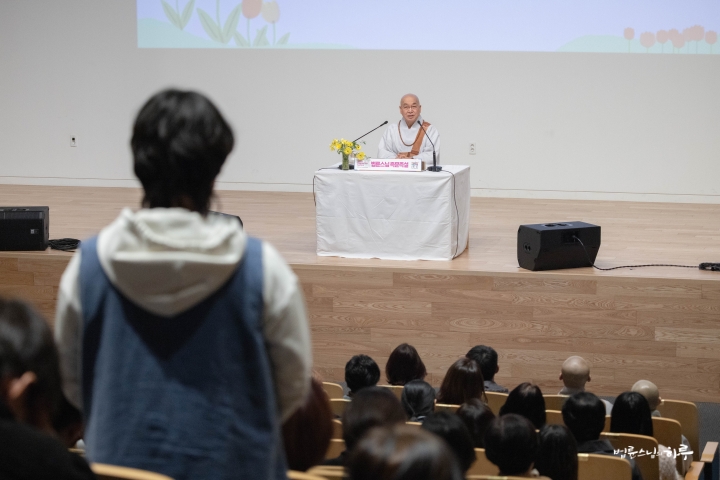
“Taking it easy doesn’t mean being lazy or idle. It means steadily doing the work you’re given without feeling too burdened or trying too hard to excel. If you keep at it consistently, you’ll naturally get better over time. The problem is not taking responsibility for your duties, but there’s no need to try too hard. Be consistent while taking it easy, but make sure you work at least enough to justify your salary.
In marriage too, there’s no need to try too hard. That creates pressure and eventually leads to exhaustion. Whatever you do, approach it playfully. But that doesn’t mean being lazy. You should fulfill the minimum roles of a wife, husband, or parent. If you try too hard with your children, you’ll burn out. Just make sure they don’t go hungry and have clothes to keep them warm. This is enough, and there won’t be any problems. If parents try too hard with their children, both the parents get exhausted and the children are more likely to go astray. I hope you’ll adopt this perspective and live your life lightly.”
The questions continued to flow.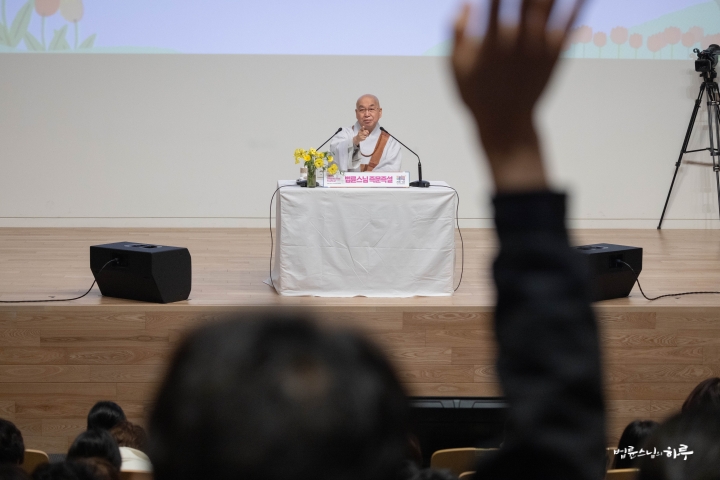
I received a legal penalty through a summary order due to my mistake when I stopped taking medication for mental health issues. I’m worried that this record might hinder my social life in the future.
After President Yoon Suk Yeol’s martial law situation, it seems like the legal order in South Korea is collapsing. What perspective should a practitioner have in this situation?
In the Sutra of Filial Piety, it says that children born with difficulty will be unfilial later. I had a difficult delivery with my child. Will my child really be unfilial?
Despite our significant age difference, my husband acts childishly. How should I view my childlike husband?
I chose my husband, but I’m frustrated by his economic incompetence. How should I live with a husband who often blames others?
Many people raised their hands wanting to ask questions, but we had to end the morning session at 11:30 AM, with the remaining questions to be addressed in the evening lecture.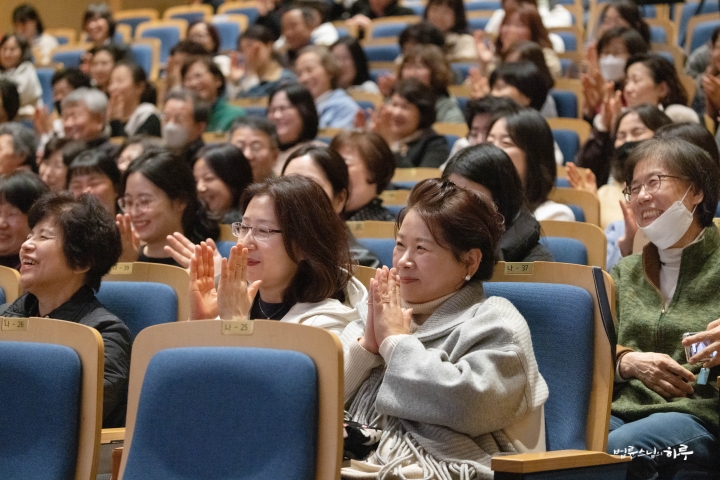
Sunim immediately left for a meeting with social leaders. After discussing current national issues, he returned to the Jungto Social and Cultural Center.
As the sun set, at 7:30 PM, Sunim continued with the Friday Dharma Q&A lecture in the basement auditorium. Many citizens came to the Jungto Social and Cultural Center to hear the Dharma Q&A. They registered on-site or submitted questions before heading to the basement auditorium with light steps.
The Friday Dharma Q&A lecture began with about 5,500 people connected via YouTube and around 120 people present at the venue. After reciting the Three Refuges and Words for Practice, Sunim took his place on the stage.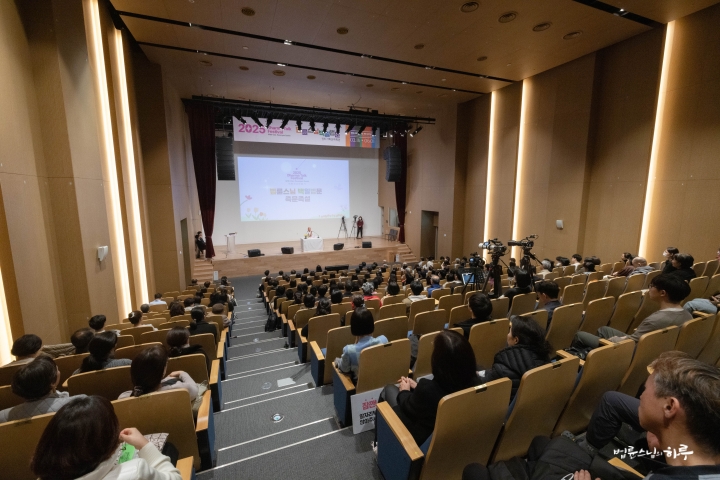
Sunim opened the conversation by sharing news of spring in Seoul.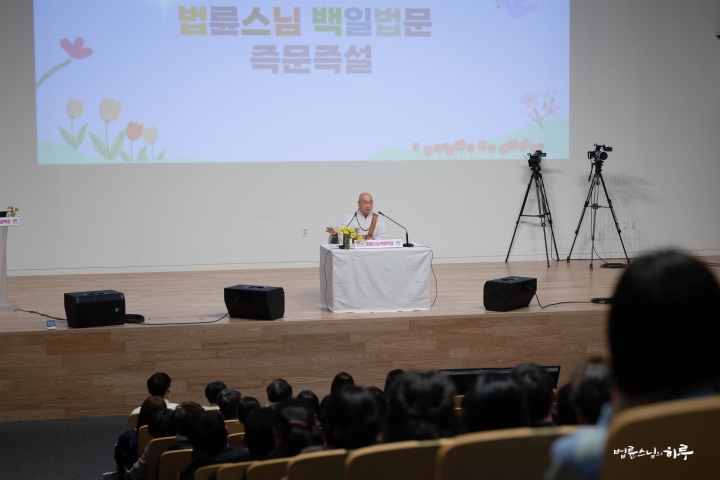
“February was so cold that it seemed spring would be very late. But in Seoul, the forsythia flowers are already blooming yellow. It seems there is no more winter general to stop the coming spring. Just as spring comes, I hope a warm spring will come to your hearts as well.”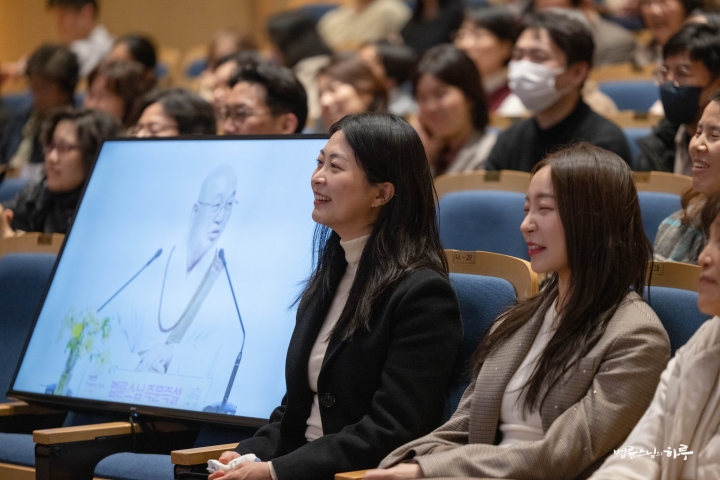
Then Sunim began taking questions from the audience. Over an hour and a half, six people raised their hands and engaged in conversation with Sunim. One person expressed distress about not being able to immigrate to the United States and asked Sunim for advice on whether it would be good to immigrate even now.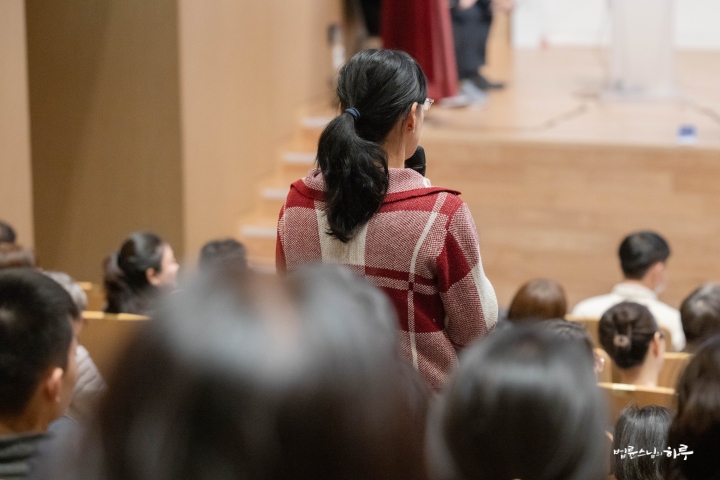
My Friends Who Went to the U.S. and Succeeded… Should I Immigrate Too?
“It sounds like a mouse is licking its lips, trying to eat poison. It’s as if you’re asking me how you can eat the poison.”
“When I actually try to immigrate, I think, ‘If I only think about myself, it might be more comfortable to stay here. My parents are here!’ But just as I regret not immigrating in my 20s now, I think I’ll regret it again in 10 years, thinking, ‘Ah! I was still young then, I should have gone a little earlier and helped my child settle.'”
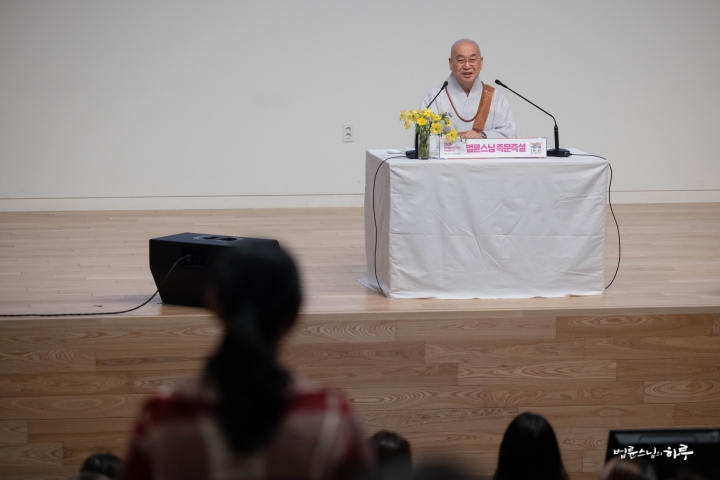
“Your life will be painful going forward. If you stay here, you will definitely regret it in 10 years. When you turn 50, you’ll think, ‘I should have gone in my early 40s! 50s seems too late!’ Looking back then, it will seem like you could have adapted better if you had immigrated when you were a bit younger. When you reach 50, you’ll think ‘it’s too difficult now,’ but when you turn 60, you’ll think ‘I could have still gone when I was 50.’ So if you don’t immigrate, you’ll regret it. But if you actually immigrate, you’ll regret it even more. So no matter what choice you make, you’re bound to regret it. That’s why I said you’re going to live a painful life. It’s because your way of thinking is flawed. First, is it easy to immigrate to the United States these days?”
“It’s difficult.”
“Even people who are already immigrants are being deported. So the probability of being able to immigrate is very low. That’s because they’ve raised the barriers tremendously. If the barrier was 1 meter in the past, it’s about 10 meters now. It’s not impossible, but it’s that much more difficult.
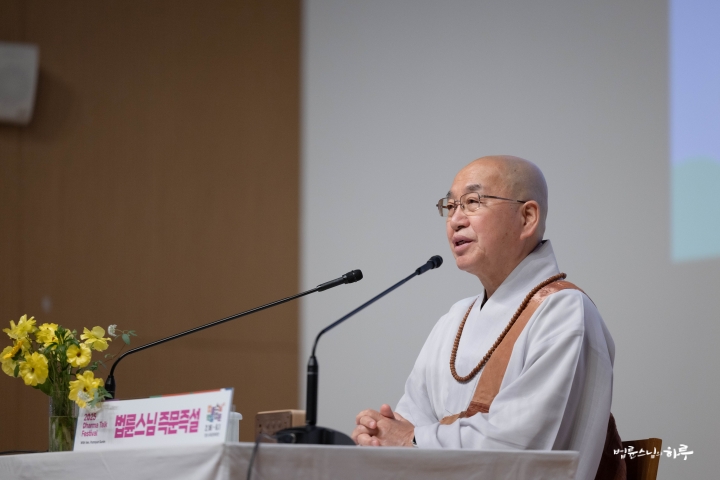
Second, you’re only looking at the most successful of your friends who have immigrated and envying them. Let’s say, for example, that 10 people immigrated to the United States. Among them, some will have done well, and some won’t have. According to general statistics, about 25 percent will have done very well, 25 percent will have done somewhat well, 25 percent will be struggling a bit, and 25 percent will be struggling a lot. But you’re looking at the most successful 25 percent and thinking, ‘Ah! Living in America is so good!’ and envying them. Conversely, if you saw the 25 percent who are struggling greatly, you’d feel relieved thinking, ‘How fortunate that I didn’t go!’
But the people who are struggling after immigrating aren’t well-known. It’s similar to the saying, ‘The dead don’t speak.’ On the other hand, what about those who have succeeded after immigrating? Their success stories are known so widely that it’s almost noisy. The reason you’re regretting is because of this principle. If you actually immigrate, it’s impossible to predict which group you’ll belong to. In the current situation in the United States, if you immigrate, the probability of belonging to the lower-middle class or below is higher than in the past. So your regret is bound to deepen.
Since you have a desire to immigrate, if you don’t go, your regret will deepen as time passes, and if you do go, the probability of regretting it more is very high. It’s very difficult to realize this now. Currently, you regret not having immigrated, but you haven’t experienced regretting having immigrated. Conversely, if you immigrate and regret it, you’ll have that experience, but you won’t have the experience of regretting not having immigrated more. No matter what you choose, there’s no standard for evaluation. So it’s very difficult to compare either choice. Therefore, first, with this approach to resolution, there’s a high possibility that you’ll regret whichever option you choose. 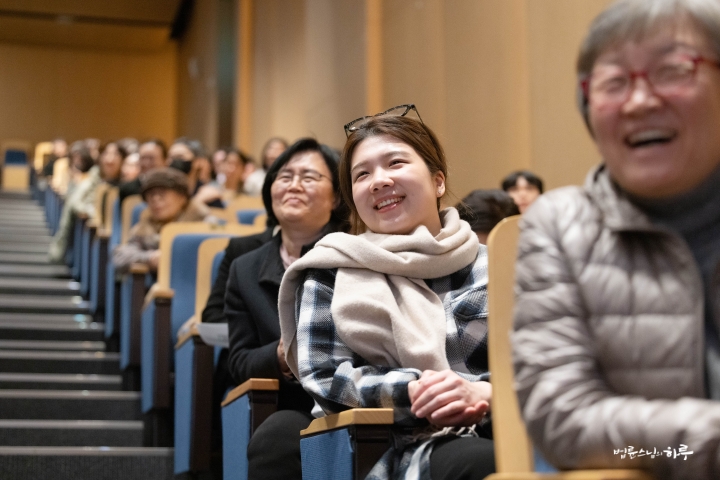
Third, if you immigrate with the mindset that “I’m doing this for my child,” you’ll end up harming your child. When you immigrate, adapting to a new environment is challenging, and during those difficult times, you’ll likely blame your child. Thoughts like “If only I hadn’t immigrated, things would have been fine—it’s because of you!” will constantly arise. So when your child doesn’t study or doesn’t meet your expectations, you’ll nag them: “I’m going through all this hardship because of you, and you’re not even studying?” This puts tremendous stress on your child. That’s why many children from immigrant families end up having problems. I’m not saying this happens 100% of the time, but the probability is much higher.
Therefore, even if you do immigrate, you shouldn’t think you’re doing it for your child. You should immigrate with the mindset that you’re doing it for yourself. Humans live for themselves, not for others. So thinking “it’s for my child” is an illusion. If you immigrate, do it simply for yourself. With this approach, even if your child has problems, you won’t blame them. Instead, you can comfort them by saying, “I’m sorry. I came because I wanted to, and now you’re suffering!” Even if your child gets into trouble, you can apologize: “I’m sorry. I only thought about myself when coming here, and now you’re having a hard time!” This allows your child to grow up healthy. However, if you think “I came here for you,” you’ll blame your child for even minor mistakes: “I came all this way just for you, what about me who’s living through all this hardship?” So it seems highly likely that you’ll regret immigrating. 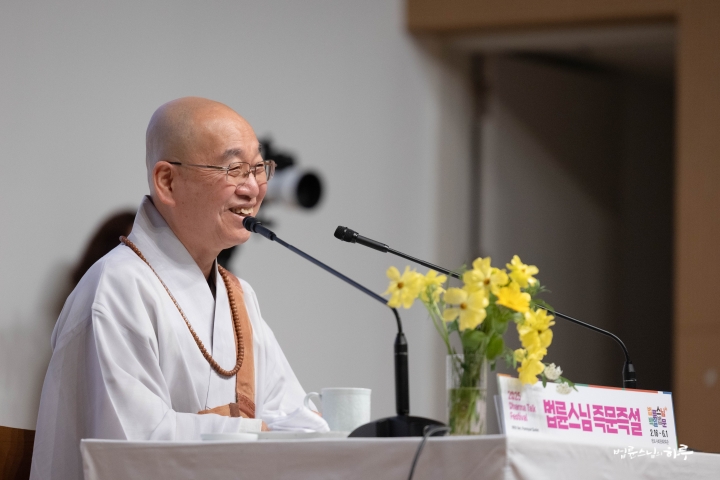
If you ask, “Then what should I do?” I would like to say, “Do whatever you want.” You will regret it whether you immigrate or not. There’s no escaping this dilemma.
In this morning’s talk, a young person said they wanted to quit their job even though they didn’t have anything specific they wanted to do. I advised them to just continue at their current workplace. Even if you have something clear you want to pursue, quitting your job these days could put you in financial difficulty. That’s the current situation in South Korea. From the perspective of expanding your opportunities, I could say that your chances of success might be higher if you immigrated to Vietnam or India. This is because these countries are growing vigorously. If you go to Vietnam or India and struggle a bit, you’ll likely see windows of opportunity. In such rapidly growing countries, your probability of success might be around 60 percent, whereas in developed countries like the United States, it drops to about 40 percent.
Looking at President Trump’s words and actions these days, does America seem wealthy or not? They’re trying to extort money from other countries through intimidation and threats because they don’t have enough. They’re not taking from enemy states but trying to extort from their allies, which is why these allies are in an uproar. You’re talking about going to such a place. Currently, the probability of success if you immigrate to the United States is very low. So I think it’s better for you to just continue living as you are now. Don’t be swayed by stories of others’ success. That’s like a mouse eating rat poison.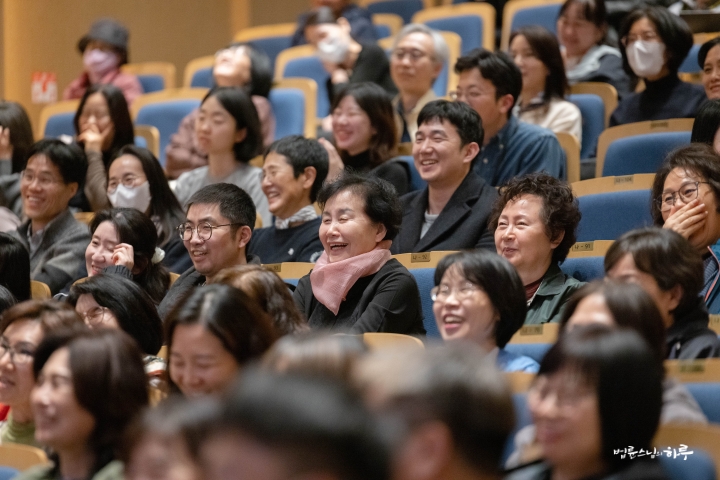
If you are currently a doctor and have secured a job at a hospital in the United States, then immigration would be appropriate. When you have something concrete like that, immigration can be a good choice. Conversely, even if you have nothing at all, immigration can still be a good option. If you’re going with just yourself, it can be a reasonable choice because hourly wages in the US are about twice as high as in Korea. However, with ambiguous circumstances like yours, there are no clear advantages, making failure more likely. Especially if you go with children, there’s a high possibility that they will struggle.”
“Thank you. I understand now.”
The questions continued to flow.
I’m receiving treatment for obsessive-compulsive disorder, but it seems to be becoming more entrenched. I fight with my wife and feel angry when I’m disadvantaged by my supervisor at work. How can I overcome this situation?
I experienced burnout three years ago and have been taking antidepressants since then. I can’t escape feelings of resentment and sadness. I don’t understand why I feel this way.
People say it’s good to share meals with others, but I prefer eating alone. Am I foolish for feeling this way?
I have a good job with a good salary and excellent benefits. However, it’s physically demanding. Is it wrong to find comfort by comparing my situation to others’ misfortunes?
I run a hair salon, and my daughter says she’s embarrassed and wants us to move to Gangnam or Bundang. I’m not sure what to do.
By the time the conversation ended, it was past 9 PM. Following the volunteers’ guidance, the audience gathered in the main hall dispersed and headed home. Sunim expressed his gratitude to the volunteers for their hard work before making his way to the Jungto Center.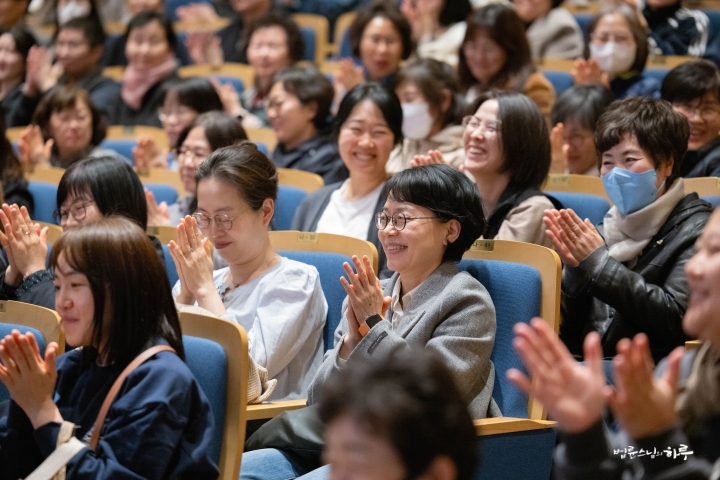
Tomorrow will be the 34th day of the 100-Day Dharma Talk. The 1080 Prostration Practice will be held at the Jungto Social and Cultural Center, and Sunim will participate online in the entrance ceremonies for the Jungto Buddhism Course and Jungto Sutra Course, where he will deliver a commemorative Dharma talk.




